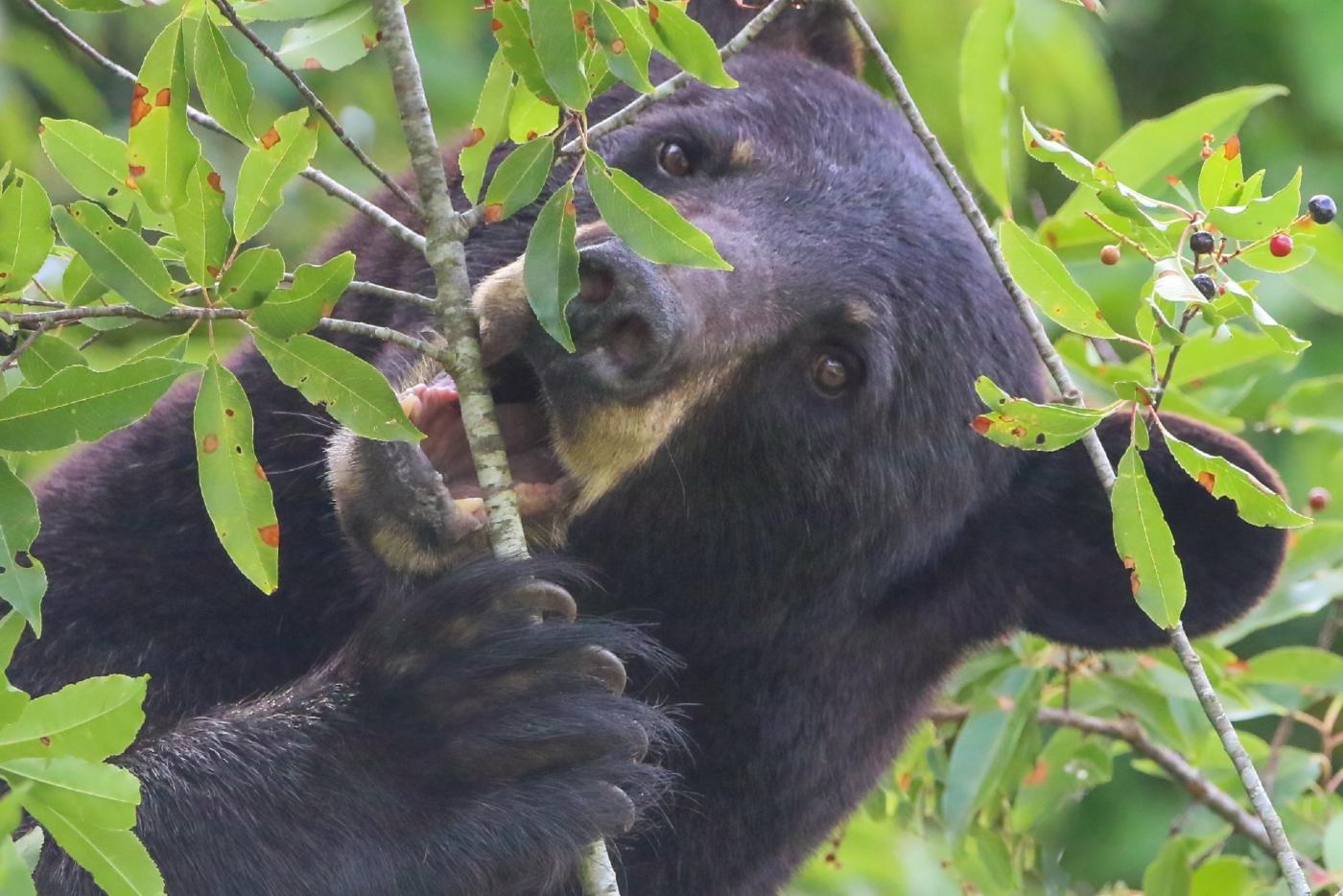The N.C. Wildlife Resources Commission (NCWRC) advises that black bears’ eating behavior alters in the late summer through fall. They significantly increase their food consumption to prepare for the colder months when natural food is less available. It’s called hyperphagia and it means “extreme appetite.” Which means they are on the search. For food. And they are not picky eaters!
“In late summer through fall, black bears are consuming a variety of hard and soft mast species, from acorns and hickory nuts to pokeberry, cherry, grapes and black gum,” said Black Bear Biologist Jenna Malzahn. “They’ll also take advantage of agricultural crops, such as soybeans and standing corn, as well as bird feeders and unsecured garbage and compost.”
With this level of food consumption, which can last through early winter, bears can put on 3 pounds per day and gain anywhere from 20% to close to 100% of their summer weight!
Bears are opportunistic eaters. During hyperphagia, black bears travel extensively, sometimes beyond their home ranges, to search for food for up to 20 hours per day. This results in more chances for humans and bears to come in close proximity with each other. NCWRC experiences an increase in reports of bears in public and residential areas, in the woods and on roadways during this period. The agency suggests some ways to avoid bear encounters to help keep both humans and bears safer.
Bears are typically most active at dawn and dusk. Steps to avoid a vehicle collision with a bear or any wildlife include:
• If driving with a passenger, put them on wildlife watch.
• Always drive at a reasonable speed and follow the speed limit.
• At night, consider driving below the speed limit to give yourself more stopping time and scan the sides of the road for eyeshine at night.
• Pay extra attention in areas where bushes and trees are close to the road.
• Most insurance companies advise that if you see an animal in the road, honk your horn repeatedly, flash your high beams and try to avoid it if you can do so safely. Do not swerve into another lane or slam on your brakes unless you know you can do so safely.
Bearwise.org is a comprehensive resource that offers proven methods to avoid attracting bears.
Six At-Home BearWise Basics for coexisting with black bears provide important steps to keeping bears from looking for food at or near homes and public places.
“Even in warmer climates, such as our state, a bear’s biological clock will still activate this fall feeding frenzy, even for those bears that hibernate briefly or not at all, as natural food scarcity in winter months, not temperatures, has been a key driver for activating the hyperphagia and hibernation process,” said Game Mammals and Surveys Supervisor Colleen Olfenbuttel. “Even bears that won’t den until January or February still look for food practically around the clock and eat as much as they can find. However, in areas where bears have found dependable year-round supplies of human-provided foods, they may not hibernate at all but will eat as if they are going to.”
NCWRC suggests residents secure their property now to avoid bears denning there. Bearwise.org offers instructions to prevent denning in crawlspaces, or under porches and decks. Bears have been known to den and give birth under bushes and brush piles, or piles of building materials, vacant buildings, garages, storage sheds or vacation homes that are vacant over the winter.
Contact the N.C. Wildlife Helpline at 866-318-2401 Monday to Friday, from 8 a.m. to 5 p.m. or your local district wildlife biologist for questions or to report information about a bear incident.
For more information on black bears, visit Bearwise.org, including these resources:
Bear Encounters - How to behave if you see a bear
What bears do in September - BearWise
What bears do in October - BearWise

Wildlife Agency Cautions Bear Appetites Are at Seasonal High
Raleigh, N.C.
Sep 8, 2025
